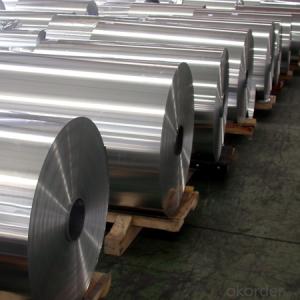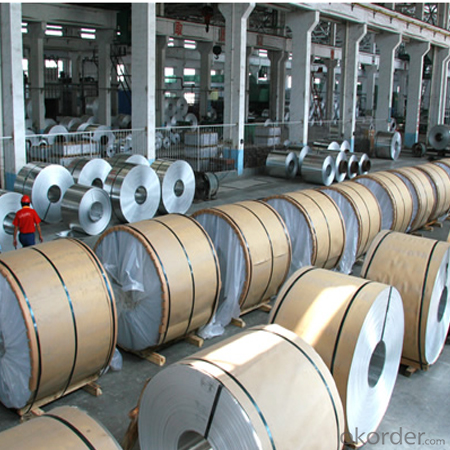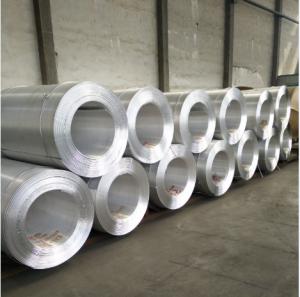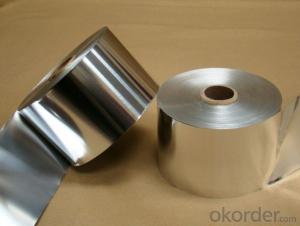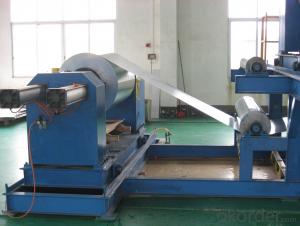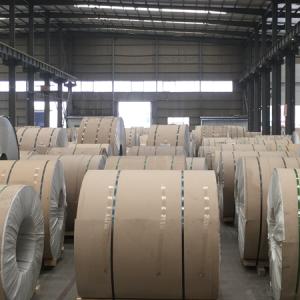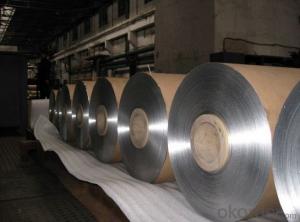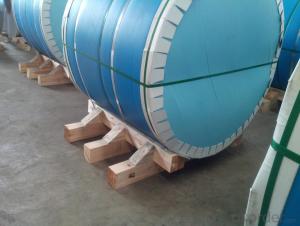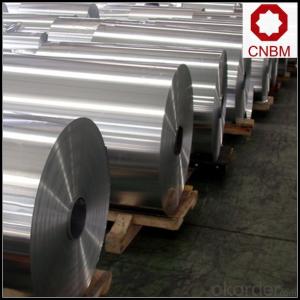5052 Marine Grade Aluminum Coil Clifton NJ Ship Plate
- Loading Port:
- Shanghai
- Payment Terms:
- TT OR LC
- Min Order Qty:
- 5 m.t.
- Supply Capability:
- 6000 m.t./month
OKorder Service Pledge
Quality Product, Order Online Tracking, Timely Delivery
OKorder Financial Service
Credit Rating, Credit Services, Credit Purchasing
You Might Also Like
Specification
Grade:
1000 Series,5000 Series,7000 Series,3000 Series
Surface Treatment:
Coated,Mill Finish,Color Coated,Enameled Wire
Shape:
Angle,Flat,Rectangular
Temper:
O-H112,Soft,Half Hard,Hard
Application:
Decorations,Door & Window,Transportation Tools,Kitchen Use
Technique:
DC/CC
Thickness:
0.05-4.0mm
Width:
900--1500mm
Outer Diameter:
450-600
Net Weight (kg):
2.5 ton
Packaging:
Wooden pallets
5052 Marine Grade Aluminium Alloy Sheet Ship Plate
Packaging & Delivery
Product Specification | |
Grade | 1000 Series: 1050 1060 1100 3000 Series: 3003 3004 3105 5000 Series: 5052 5605,5083 6000 Series: 6061 6063 8000 Series: 8011 8021 8079 |
Thickness | 0.20-8.00mm |
Width | 2400mm max. |
Grade | 1000,3000,5000,6000,8000series |
Coil ID | 75mm, 150mm, 200mm, 300mm, 400mm, 508mm or negotiable |
Coil weight | 1000-5000kgs |
Coil OD | 1700mm max. |
Temper | O, H12, H14, H16, H111, H22 ,H24, H26, H28,T4, T6,etc. |
| Temper | |
| F | processing state |
| H | strain hardening state |
| O | annealing |
| T | heat treatment state |
| H112 | pure state of strain hardening, adjustment has been made to degree of strain hardening and annealing |
| T4 | solid solution treatment and natural efficiency to achieve sufficient stability condition |
| T5 | artificial aging condition of the reentry after high temperature thermal cooling |
| T6 | artificial aging state after solid solution treatment |
Chemical Composition | |||||||||
| Grade | Si | Fe | Cu | Mn | Mg | Cr | Ni | Zn | Al |
| 1050 | 0.25 | 0.4 | 0.05 | 0.05 | 0.05 | - | - | 0.05 | 99.5 |
| 1060 | 0.25 | 0.35 | 0.05 | 0.03 | 0.03 | - | - | 0.05 | 99.6 |
| 1070 | 0.2 | 0.25 | 0.04 | 0.03 | 0.03 | - | - | 0.04 | 99.7 |
| 1100 | Si+Fe:0.95 | 0.05-0.2 | 0.05 | - | - | 0.1 | - | 99 | |
| 1200 | Si+Fe:1.00 | 0.05 | 0.05 | - | - | 0.1 | 0.05 | 99 | |
| 1235 | Si+Fe:0.65 | 0.05 | 0.05 | 0.05 | - | 0.1 | 0.06 | 99.35 | |
| 3003 | 0.6 | 0.7 | 0.05-0.2 | 1.0-1.5 | - | - | - | 0.1 | remains |
| 3004 | 0.3 | 0.7 | 0.25 | 1.0-1.5 | 0.8-1.3 | - | - | 0.25 | remains |
| 3005 | 0.6 | 0.7 | 0.25 | 1.0-1.5 | 0.20-0.6 | 0.1 | - | 0.25 | remains |
| 3105 | 0.6 | 0.7 | 0.3 | 0.30-0.8 | 0.20-0.8 | 0.2 | - | 0.4 | remains |
| 3A21 | 0.6 | 0.7 | 0.2 | 1.0-1.6 | 0.05 | - | - | 0.1 | remains |
| 5005 | 0.3 | 0.7 | 0.2 | 0.2 | 0.50-1.1 | 0.1 | - | 0.25 | remains |
| 5052 | 0.25 | 0.4 | 0.1 | 0.1 | 2.2-2.8 | 0.15-0.35 | - | 0.1 | remains |
| 5083 | 0.4 | 0.4 | 0.1 | 0.40-1.0 | 4.0-4.9 | 0.05-0.25 | - | 0.25 | remains |
| 5154 | 0.25 | 0.4 | 0.1 | 0.1 | 3.1-3.9 | 0.15-0.35 | - | 0.2 | remains |
| 5182 | 0.2 | 0.35 | 0.15 | 0.20-0.50 | 4.0-5.0 | 0.1 | - | 0.25 | remains |
| 5251 | 0.4 | 0.5 | 0.15 | 0.1-0.5 | 1.7-2.4 | 0.15 | - | 0.15 | remains |
| 5754 | 0.4 | 0.4 | 0.1 | 0.5 | 2.6-3.6 | 0.3 | - | 0.2 | remains |
| 6061 | 0.40-0.8 | 0.7 | 0.15-0.40 | 0.15 | 0.8-1.2 | 0.04-0.35 | - | 0.25 | remains |
| 6063 | 0.20-0.6 | 0.35 | 0.1 | 0.1 | 0.45-0.9 | 0.1 | - | 0.1 | remains |
| 6082 | 0.7-1.3 | 0.5 | 0.1 | 0.40-1.0 | 0.6-1.2 | 0.25 | - | 0.2 | remains |
| 6A02 | 0.50-1.2 | 0.5 | 0.20-0.6 | Or Cr0.15-0.35 | 0.45-0.9 | - | - | 0.2 | remains |
| 8011 | 0.50-0.9 | 0.6-1.0 | 0.1 | 0.2 | 0.05 | 0.05 | - | 0.1 | remains |
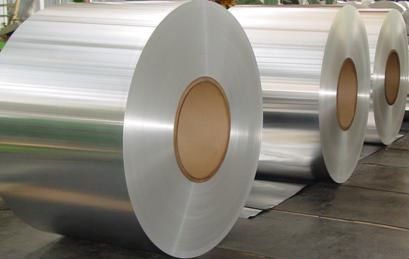
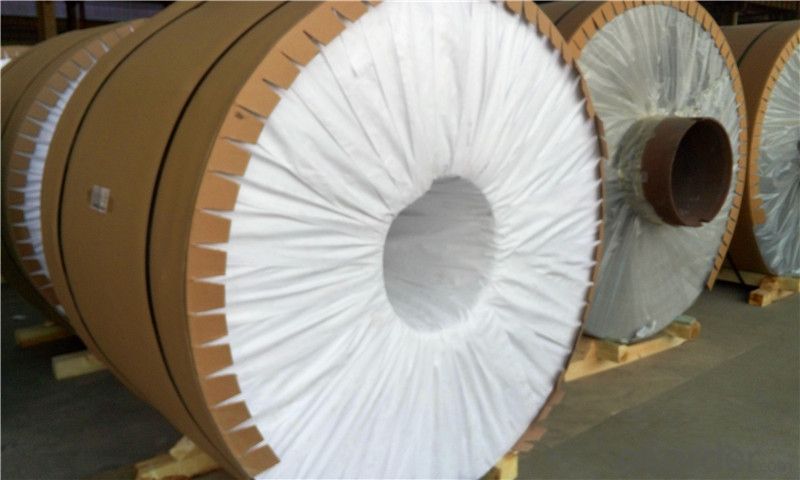
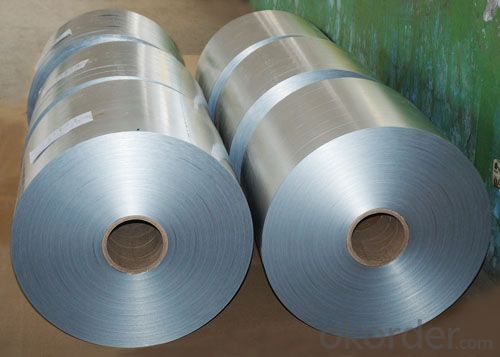
- Q: What are the common sizes and thicknesses of aluminum coils?
- Common sizes and thicknesses of aluminum coils vary depending on the specific application and industry. However, there are some standard sizes and thicknesses that are commonly used across various industries. In terms of size, aluminum coils typically range from around 12 inches to 72 inches in width. This range allows for flexibility in accommodating different production processes and equipment. The length of the coils can vary as well, but it is often in the range of 1000 to 6000 feet. As for thickness, aluminum coils come in various gauges, which are commonly measured in inches or millimeters. The most commonly used thicknesses for aluminum coils are between 0.019 inches (0.48 mm) and 0.125 inches (3.18 mm). These thicknesses are suitable for a wide range of applications, including roofing, construction, automotive, and manufacturing. It is important to note that these are general guidelines, and the specific size and thickness requirements may vary depending on the intended use of the aluminum coils. Additionally, custom sizes and thicknesses can also be manufactured to meet specific project requirements.
- Q: I need help with 3 main ideas for a aluminum and copper chloride lab. I need evidence for these 3 ideas that what happened was a chemical reaction.
- Aluminum metal usually has a passivating layer of Al2O3 which prevents aluminum from reacting with Cu2+ ions. Al won't react with CuSO4(aq), for instance. But if NaCl is added then it will. It is the effect of the chloride ion that makes the reaction go. Al2O3(s) + 8Cl-(aq) + 3H2O -- 2[AlCl4]^- + 6OH- Once the passivating layer is dissolved, then aluminum metal is available to react with chloride ion. You see the aluminum metal disappear, while dark red Cu metal is formed, along with the decrease in the blue color due to hydrated copper ions, [Cu(H2O)6]^2+. In addition, aluminum metal has a side-reaction with water to form hydrogen gas. Therefore, you will observe that as gas is given off. Not only that, the temperature of the solution will increase. 2Al(s) + 2OH- + 6H2O -- 2[Al(OH)4]- + 3H2(g) In summary. There are four indicators of a chemical reaction. 1. The formation of a precipitate 2. The evolution of a gas 3. A color change 4. A temperature change. All four indicators are observed. Solid Cu metal is formed. Hydrogen gas is given off. The color of the solution changes from blue to colorless, and the temperature increases.
- Q: What are the width tolerances for aluminum coils?
- The width tolerances for aluminum coils vary depending on the specific grade and type of coil. However, typical width tolerances for aluminum coils range from +/- 0.005 to 0.020 inches.
- Q: Can aluminum coils be used in the production of aluminum gutters?
- Aluminum gutters can indeed be produced using aluminum coils. In fact, aluminum coils are commonly employed in the manufacturing process of aluminum gutters. These coils are crafted from an aluminum alloy, which happens to be a material that is both lightweight and long-lasting. By utilizing specialized machinery, these coils are expertly molded into the desired gutter profile. The utilization of aluminum coils enables the production of gutters to be efficient and precise, thereby guaranteeing a top-notch final product. Furthermore, aluminum possesses the advantageous quality of being resistant to corrosion, rendering it an ideal material for gutters that will be exposed to various weather elements like rain and snow. All in all, due to their durability, strength, and corrosion resistance, aluminum coils prove to be an excellent choice for the production of aluminum gutters.
- Q: How are aluminum coils used in the production of furniture and fixtures?
- Furniture and fixture production heavily relies on aluminum coils, which play a vital role in creating lightweight and long-lasting pieces. These coils are typically crafted from top-notch aluminum alloys, known for their exceptional strength-to-weight ratios and resistance to corrosion. One primary application of aluminum coils in furniture production involves constructing frames for chairs, tables, and other seating arrangements. Aluminum's lightweight nature simplifies handling and transportation, while still providing the necessary structural integrity. The coils can be easily molded, welded, and assembled into various frame designs, offering flexibility in creating different furniture styles. Furthermore, aluminum coils find frequent use in manufacturing fixtures like cabinets, shelves, and display racks. These coils can be cut, shaped, and bent to create customized components that perfectly suit specific design requirements. Aluminum's corrosion resistance ensures that these fixtures can endure exposure to moisture, making them suitable for both indoor and outdoor settings. Moreover, the utilization of aluminum coils in furniture and fixture manufacturing offers advantages that go beyond their physical properties. Aluminum is a highly recyclable material, making it an environmentally friendly choice. Its durability and low maintenance requirements also contribute to cost-effectiveness, reducing long-term expenses for manufacturers and consumers alike. To summarize, aluminum coils are indispensable in furniture and fixture production due to their lightweight, durable, and corrosion-resistant characteristics. Their versatility enables the creation of various designs, while their recyclability and cost-effectiveness make them a preferred choice in the industry.
- Q: Are aluminum coils suitable for soundproofing applications?
- No, aluminum coils are not suitable for soundproofing applications.
- Q: What is the expected lead time for manufacturing aluminum coils?
- The expected lead time for manufacturing aluminum coils can vary depending on the complexity of the order, the quantity needed, and the production capacity of the manufacturer. Generally, it can range from a few weeks to a couple of months.
- Q: How are aluminum coils measured and specified?
- Aluminum coils are typically measured and specified using two key parameters: thickness and width. The thickness of an aluminum coil refers to the thickness of the aluminum sheet used to make the coil, and it is commonly measured in millimeters (mm) or gauge. The width of a coil, on the other hand, refers to the width of the aluminum sheet that is wound into a coil shape and is usually measured in inches or millimeters. These measurements and specifications are crucial in determining the suitability of the coil for various applications and manufacturing processes.
- Q: What are the different color options available for aluminum coils?
- Aluminum coils offer a range of color options to choose from. Popular choices include white, black, gray, brown, and beige. These colors are obtained by applying a layer of paint to the aluminum coil using a technique known as coil coating. The paint used is of high quality and durability, ensuring resistance against fading, chipping, and cracking. Apart from these standard colors, there is also the option to customize the color according to individual preferences and design requirements. This customization is achieved through a color matching process, where a specific color is created for the project. The wide variety of color options available for aluminum coils ensures that there is a suitable choice for any residential, commercial, or industrial application.
- Q: Can aluminum coils be used in electrical cables?
- Electrical cables can indeed incorporate aluminum coils. Aluminum is widely utilized as a material for electrical conductors due to its exceptional electrical conductivity and comparatively lower cost when compared to copper. Its usage is particularly prominent in power transmission and distribution cables that necessitate long-distance transmission. Overhead power lines and underground cables often employ aluminum coils. However, it is crucial to acknowledge that aluminum possesses a lower tensile strength than copper, requiring careful design and manufacturing of the cables to ensure sufficient mechanical strength. Furthermore, achieving the same electrical performance with aluminum conductors necessitates larger cross-sectional areas compared to copper, potentially resulting in slightly larger cable sizes.
Send your message to us
5052 Marine Grade Aluminum Coil Clifton NJ Ship Plate
- Loading Port:
- Shanghai
- Payment Terms:
- TT OR LC
- Min Order Qty:
- 5 m.t.
- Supply Capability:
- 6000 m.t./month
OKorder Service Pledge
Quality Product, Order Online Tracking, Timely Delivery
OKorder Financial Service
Credit Rating, Credit Services, Credit Purchasing
Similar products
Hot products
Hot Searches
Related keywords
